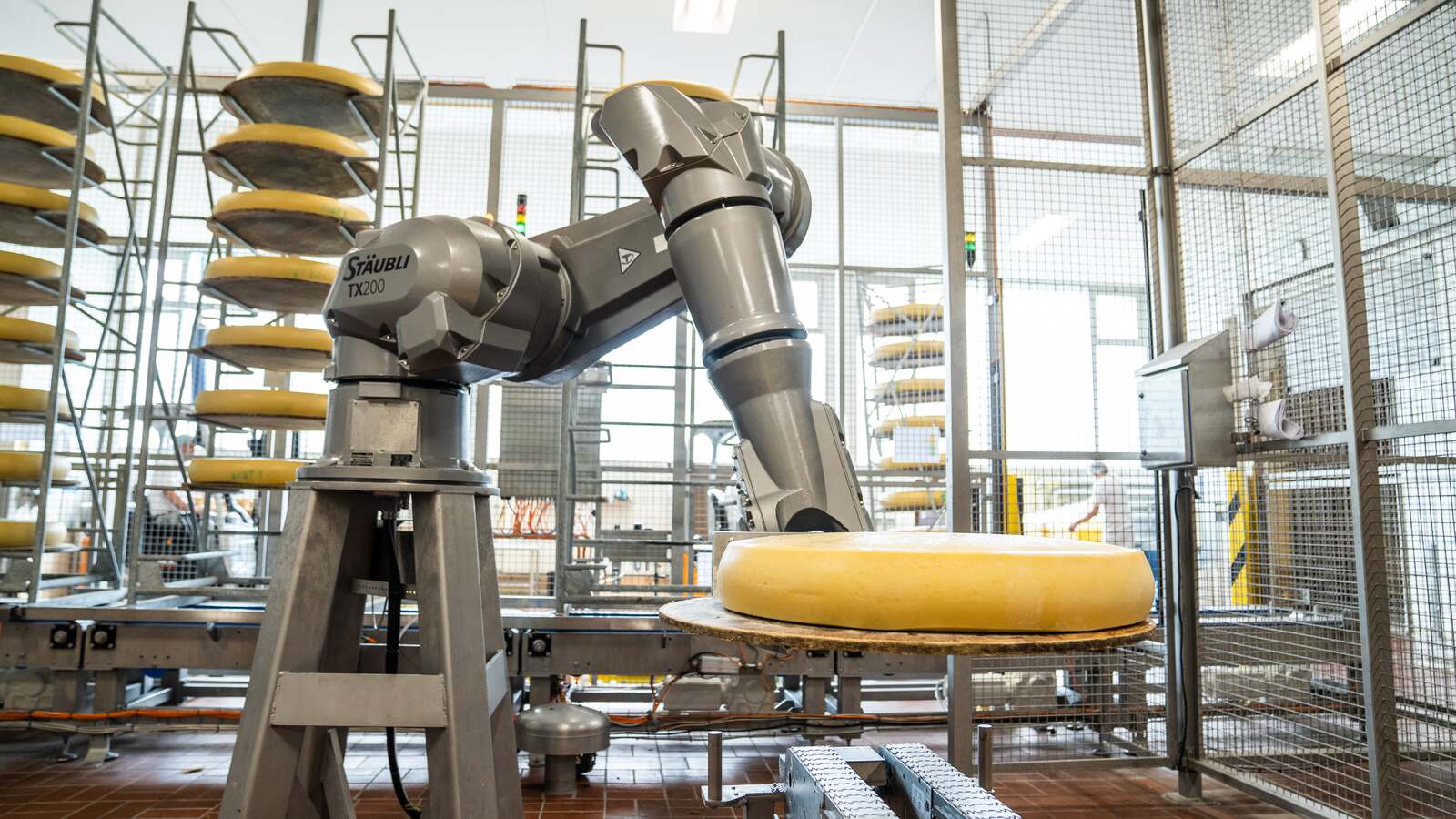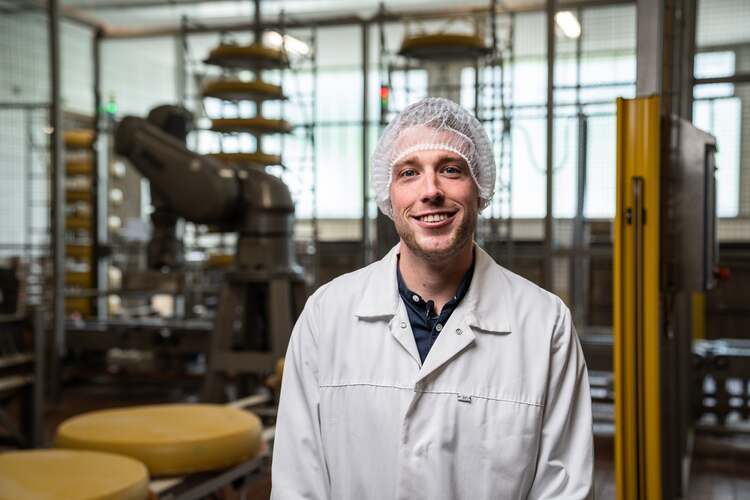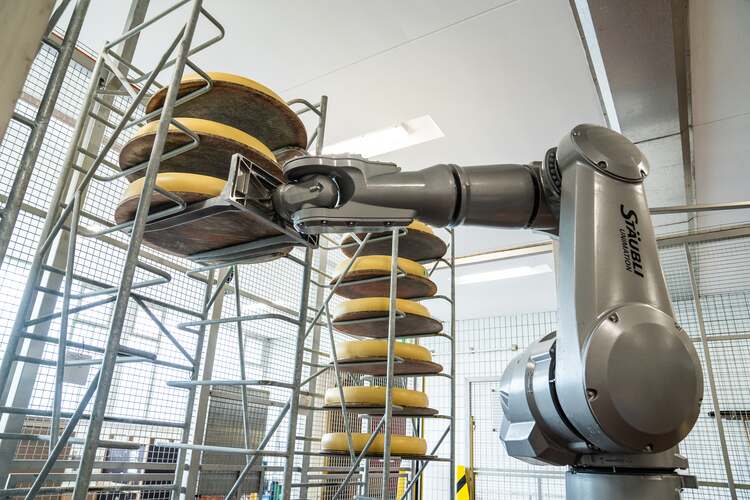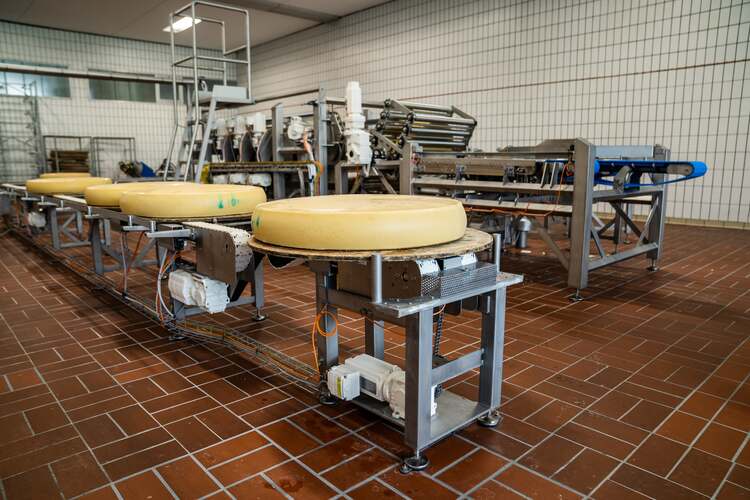
Fully automated cheese maintenance with a robot
Stäubli six-axis machine used in the aging of Emmental cheese
Mar 22, 2022 — The quality of cheese ultimately depends on proper storage and aging. This is why the Leupolz Emmental cheese dairy in Germany’s Allgäu Alps opted for an innovative, fully automated storage and maintenance system in which round cheese loaves, each weighing approximately 80 kilos, are handled by a large Stäubli six-axis machine.
The TX200L HE transfers the round cheese to the maintenance system's conveyor belt. © Stäubli
The Leupolz farm cheese dairy is located near Wangen, just north of Lake Constance, in a truly idyllic setting surrounded by forests, pastures and meadows. Founded in 1960, the cooperative employs 25 people and obtains its milk from around 170 suppliers. It processes around 45 million liters per year, equivalent to about 125,000 liters per day. Among the dairy’s specialties are cheese “wheels” weighing approximately 80 kilos, some 6,000 of which leave the farm every year, with around 10% qualifying for the Demeter organic label.
The correct maintenance and care of these huge cheeses is a laborious business. Achim Baumgärtner, Executive Assistant at Leupolz, explains: “Each cheese wheel has to be attended to about three times a week to ensure optimal quality. With an average maturation period of four months, the cheeses have to be washed, brushed and salted between 40 and 50 times, which is potentially costly in terms of labor and expenditure.”

The management team at Leupolz was looking for a solution that would be as efficient as it was economical, so that they could offer this natural product at a competitive price despite the intensive effort that goes into its storage and care. The vision of a fully automated system began to take shape…
Hygienic robots in preference to problematic linear axes
To realize this vision, they brought in Lemmermeyer, a plant manufacturer based in the Bavarian town of Deiningen. The company has extensive experience in the field of stainless steel plant construction and has built an especially strong reputation for itself in the food sector.
The stainless steel cheese maintenance system, which entered operation in 2019, is a prime example of Lemmermeyer’s design expertise. Attention was paid to compliance with stringent hygiene standards, avoidance of dead spaces, and the right choice of robot for handling the cheese wheels – in this case, the large six-axis Stäubli TX200L HE.
“If we had used classic linear axes for the handling processes within the plant, we would have come up against a major hygiene obstacle,” says Manfred Görthofer, Head of Project Management at Lemmermeyer. “Condensation buildup and lubricant contamination via the joints of the axes could not have been avoided, and this is of course problematic when processing unwrapped foodstuffs. That’s why we are increasingly moving towards the use of encapsulated Stäubli robots with their superior hygiene design for such processes.”
80 cheese wheels per hour
The Leupolz setup clearly demonstrates that the robot-assisted cheese maintenance system not only complies with strict hygiene standards, but is also impressive in terms of performance, with around 80 cheese wheels passing through the system in the space of an hour. The task of the TX200L HE (HE = Humid Environment) is to load and unload racks with either four or eight shelves on which the cheese wheels are stored. A forklift collects the racks from the maturation chamber, delivers them to the processing area, and returns them afterwards.
The six-axis robot is equipped with a special gripper that resembles the prongs of a forklift. It uses this to pick up the wooden board on which the cheese rests and places it on the system’s conveyor belt. The next step is to separate the board from its cheese wheel. The board is then cleaned, while the cheese is washed, brushed, sprayed with salt and dried with a blower. The final step is to place the cheese wheel back on its board and move it to a defined transfer position on the conveyor belt. Here, the TX200L HE picks it up and places the board together with the cheese wheel back in the correct compartment of the rack.

To ensure that the six-axis machine can approach all stations without hindrance, it is mounted on a base unit. The TX200L has a reach of just under 2.6 meters, and with a total weight of 100 kilograms to be handled (80-kg cheese wheel, 5-kg wooden board and 15-kg gripper), axis 6 operates at its full payload limit.
Trouble-free operation from day one
Even when the robot is lifting and carrying its maximum payload, it can still easily cope in continuous operation. As Achim Baumgärtner says, “Our TX200L HE has been running absolutely trouble-free since commissioning. The same applies to the entire system. We have not experienced any failures here, and even our daily cleaning procedures are incapable of harming the system or the robot.”
Stäubli’s HE robots have indeed been designed to endure even the toughest cleaning procedures with aqueous media in the 2pH - 12pH range. These robots even withstand spraying by a high-pressure water jet without any problems. This means they can be operated without an additional protective coating and cleaned quickly and thoroughly. Plus, the HE versions are just as capable as the standard robots, which puts them among the fastest on the global market, even when operating with food-grade oil.
Higher quality – happier employees
The use of robots has also resulted in impressive savings. “In the past, we needed three people to attend to the cheese. Today, it’s done by ‘half’ an employee,” says Achim Baumgärtner. “Of course, this saves on labor costs and, much more importantly, we can relieve our staff of weekend working, deploy them where they are needed more urgently, and do not have to constantly ask them to work overtime. The shop floor atmosphere and the workload have improved significantly due to the higher degree of automation.”

Another important aspect concerns the care and maintenance of the cheese wheels themselves. The enormous capacity of the robotic system makes it possible to significantly shorten the washing intervals and thereby enhance overall quality. Achim Baumgärtner: “Thanks to the robot, we can now attend to the wheels up to three times a week. In the past, we had to get by on just once or twice. The more intensive care has a positive effect on the quality of the cheese, and we have a higher product yield. This works to the benefit of the end consumer, too. Our Allgäuer Emmentaler has never tasted better!”



